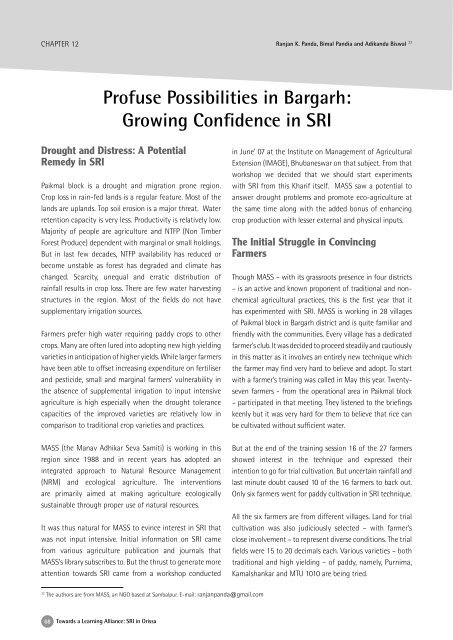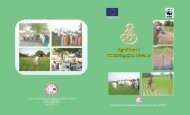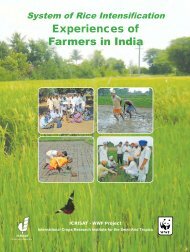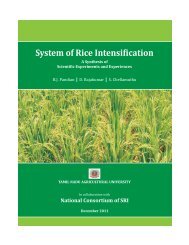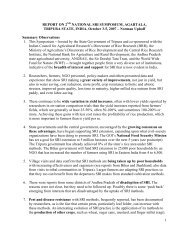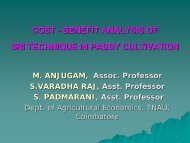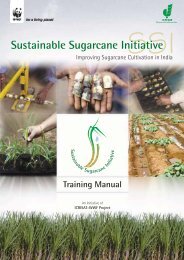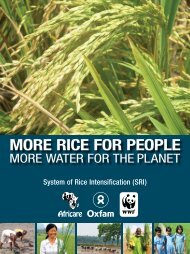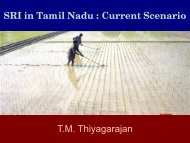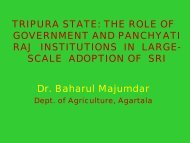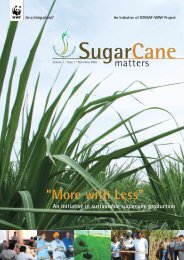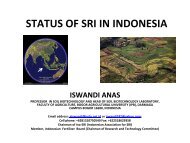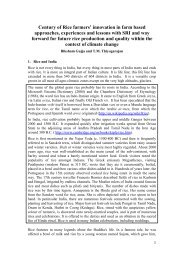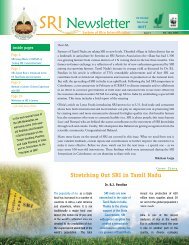SRI in Orissa - Cornell International Institute for Food, Agriculture ...
SRI in Orissa - Cornell International Institute for Food, Agriculture ...
SRI in Orissa - Cornell International Institute for Food, Agriculture ...
Create successful ePaper yourself
Turn your PDF publications into a flip-book with our unique Google optimized e-Paper software.
CHAPTER 12<br />
Ranjan K. Panda, Bimal Pandia and Adikanda Biswal 33<br />
Profuse Possibilities <strong>in</strong> Bargarh:<br />
Grow<strong>in</strong>g Confidence <strong>in</strong> <strong>SRI</strong><br />
Drought and Distress: A Potential<br />
Remedy <strong>in</strong> <strong>SRI</strong><br />
Paikmal block is a drought and migration prone region.<br />
Crop loss <strong>in</strong> ra<strong>in</strong>-fed lands is a regular feature. Most of the<br />
lands are uplands. Top soil erosion is a major threat. Water<br />
retention capacity is very less. Productivity is relatively low.<br />
Majority of people are agriculture and NTFP (Non Timber<br />
Forest Produce) dependent with marg<strong>in</strong>al or small hold<strong>in</strong>gs.<br />
But <strong>in</strong> last few decades, NTFP availability has reduced or<br />
become unstable as <strong>for</strong>est has degraded and climate has<br />
changed. Scarcity, unequal and erratic distribution of<br />
ra<strong>in</strong>fall results <strong>in</strong> crop loss. There are few water harvest<strong>in</strong>g<br />
structures <strong>in</strong> the region. Most of the fields do not have<br />
supplementary irrigation sources.<br />
Farmers prefer high water requir<strong>in</strong>g paddy crops to other<br />
crops. Many are often lured <strong>in</strong>to adopt<strong>in</strong>g new high yield<strong>in</strong>g<br />
varieties <strong>in</strong> anticipation of higher yields. While larger farmers<br />
have been able to offset <strong>in</strong>creas<strong>in</strong>g expenditure on fertiliser<br />
and pesticide, small and marg<strong>in</strong>al farmers’ vulnerability <strong>in</strong><br />
the absence of supplemental irrigation to <strong>in</strong>put <strong>in</strong>tensive<br />
agriculture is high especially when the drought tolerance<br />
capacities of the improved varieties are relatively low <strong>in</strong><br />
comparison to traditional crop varieties and practices.<br />
MASS (the Manav Adhikar Seva Samiti) is work<strong>in</strong>g <strong>in</strong> this<br />
region s<strong>in</strong>ce 1988 and <strong>in</strong> recent years has adopted an<br />
<strong>in</strong>tegrated approach to Natural Resource Management<br />
(NRM) and ecological agriculture. The <strong>in</strong>terventions<br />
are primarily aimed at mak<strong>in</strong>g agriculture ecologically<br />
susta<strong>in</strong>able through proper use of natural resources.<br />
It was thus natural <strong>for</strong> MASS to ev<strong>in</strong>ce <strong>in</strong>terest <strong>in</strong> <strong>SRI</strong> that<br />
was not <strong>in</strong>put <strong>in</strong>tensive. Initial <strong>in</strong><strong>for</strong>mation on <strong>SRI</strong> came<br />
from various agriculture publication and journals that<br />
MASS’s library subscribes to. But the thrust to generate more<br />
attention towards <strong>SRI</strong> came from a workshop conducted<br />
<strong>in</strong> June’ 07 at the <strong>Institute</strong> on Management of Agricultural<br />
Extension (IMAGE), Bhubaneswar on that subject. From that<br />
workshop we decided that we should start experiments<br />
with <strong>SRI</strong> from this Kharif itself. MASS saw a potential to<br />
answer drought problems and promote eco-agriculture at<br />
the same time along with the added bonus of enhanc<strong>in</strong>g<br />
crop production with lesser external and physical <strong>in</strong>puts.<br />
The Initial Struggle <strong>in</strong> Conv<strong>in</strong>c<strong>in</strong>g<br />
Farmers<br />
Though MASS – with its grassroots presence <strong>in</strong> four districts<br />
– is an active and known proponent of traditional and nonchemical<br />
agricultural practices, this is the first year that it<br />
has experimented with <strong>SRI</strong>. MASS is work<strong>in</strong>g <strong>in</strong> 28 villages<br />
of Paikmal block <strong>in</strong> Bargarh district and is quite familiar and<br />
friendly with the communities. Every village has a dedicated<br />
farmer’s club. It was decided to proceed steadily and cautiously<br />
<strong>in</strong> this matter as it <strong>in</strong>volves an entirely new technique which<br />
the farmer may f<strong>in</strong>d very hard to believe and adopt. To start<br />
with a farmer’s tra<strong>in</strong><strong>in</strong>g was called <strong>in</strong> May this year. Twentyseven<br />
farmers - from the operational area <strong>in</strong> Paikmal block<br />
– participated <strong>in</strong> that meet<strong>in</strong>g. They listened to the brief<strong>in</strong>gs<br />
keenly but it was very hard <strong>for</strong> them to believe that rice can<br />
be cultivated without sufficient water.<br />
But at the end of the tra<strong>in</strong><strong>in</strong>g session 16 of the 27 farmers<br />
showed <strong>in</strong>terest <strong>in</strong> the technique and expressed their<br />
<strong>in</strong>tention to go <strong>for</strong> trial cultivation. But uncerta<strong>in</strong> ra<strong>in</strong>fall and<br />
last m<strong>in</strong>ute doubt caused 10 of the 16 farmers to back out.<br />
Only six farmers went <strong>for</strong> paddy cultivation <strong>in</strong> <strong>SRI</strong> technique.<br />
All the six farmers are from different villages. Land <strong>for</strong> trial<br />
cultivation was also judiciously selected – with farmer’s<br />
close <strong>in</strong>volvement – to represent diverse conditions. The trial<br />
fields were 15 to 20 decimals each. Various varieties – both<br />
traditional and high yield<strong>in</strong>g – of paddy, namely, Purnima,<br />
Kamalshankar and MTU 1010 are be<strong>in</strong>g tried.<br />
33<br />
The authors are from MASS, an NGO based at Sambalpur. E-mail: ranjanpanda@gmail.com<br />
68<br />
Towards a Learn<strong>in</strong>g Alliance: <strong>SRI</strong> <strong>in</strong> <strong>Orissa</strong>


